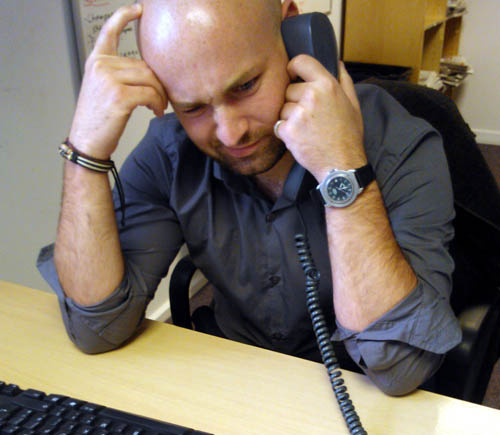FOREIGN criminals are getting a telephone translation service in prison to make sure they do not miss out on their rights.
Around 280 foreigners are locked up in Scottish prisons at an annual cost to taxpayers of more than £9m.
Now the Scottish Prison Service (SPS) is making translators available by phone at a cost that could reach £300,000-a-year.

The SPS says the system is essential to make sure new inmates from abroad are aware of their rights when they start jail terms.
But critics of the translation service said it was yet another example of criminals getting five star service while their victims suffer.
Foreigners currently serving life terms in Scottish jails include Polish male prostitute Pawel Rodak,, who murdered a university lecturer in Edinburgh in March last year, stabbing him 114 times and then tried to cover his tracks by attempting to cause an explosion.
And Lithuanian Aleksandras Skirda was found guilty for his part in the torture, murder and mutilation of 35-year-old Jolanta Bledaite in Arbroath in 2008, known as the ‘head on the beach’ killing.
Tender documents from the SPS show they are now seeking the “provision of telephone translation services for all 14 SPS establishments throughout Scotland”.
The costs of the contract have not revealed but translators can charge up to £175 an hour.
The SPS says around 10 foreign prisoners begin the induction process, which can lasts several hours or longer, every week. Even if the average was three hours, that could give an annual cost in excess of £273,000.
Robert Oxley, Campaign Manager of Taxpayers Alliance, said: “There will always be a cost of dealing with foreign criminals in our justice system but they must be kept under control.
“Prisoners requiring interpretation cost taxpayers twice, both through the impact of their crimes and from the bill for providing translation.
“Ultimately the onus should be on prisoners who can’t speak the language to learn so they can get on while behind bars and after.”
Mothers Against Murder and Aggression, an organisation dedicated to helping those affected by crime, said: “At a time when the tax payer is being constantly reminded how tough things are financially, it is incredible that new ways to spend money on offenders and services aimed at making their lives just that little bit easier, are constantly being discovered.
“Services to victims are extremely poor, and a tiny portion of the budgets that our justice systems manage go towards those services.
“We would suggest if there is spare cash available, the public would rather see it spent on attempts made to enable long neglected victims to rehabilitate.
“We look forward to the day where the needs of victims are given the same consideration as is given to those who commit crime.”
Scottish Conservative Chief Whip John Lamont MSP said: “In the current economic climate it is important that public bodies spend their budgets in the best way possible as we cannot afford to waste taxpayers’ money.
“Many people will find it hard to understand why the SPS have chosen to spend so much on this translation service, especially if it will end up hardly being used.”
The SPS has declined to put forward its own estimate for the new telephone translation service.
But it admits it paid translators in “numerous” languages £153,675 for services over the past three years.
Some of the money, according to the SPS, was spent on dinner menus in foreign languages.
Legislation relating to prisoners, who each cost more than £32,000 annually to keep locked up, has also been translated.
Translators were also sent into prisons to help inmates with the induction process.
A spokesman for the SPS defended the spending.
He said: “SPS expenditure in this area is expected to be low but that is part of the tender process.
“Currently there are around 280 foreign prisoners. Of course many of these prisoners will speak English as a first language.
“This will enable SPS staff to communicate effectively with prisoners whose first language is not English.
“The immediate induction process is only a few hours to assess the individual and prepare him or her for the regime of prison.
“Depending on sentence length it can be a number of weeks stretching into months.”

